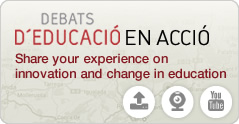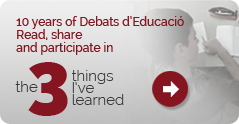- Català
- Español
- English
You are here
The Problem Solvers: from teaching students to follow instructions to preparing students to identify and solve problems
About the speaker
Charles Leadbeater
Innovation and creativity expert
Summary
The aim of education has to be to achieve success in life, considering success in its broadest sense. But we live in times where the future is uncertain, where past trends are interwoven with new trends influenced by cutting-edge technology. This means living constantly in a whirlwind (Leadbeater talks of a washing machine) from where new "things" emerge with which people have to keep creating. Children and young people need to be ready to tackle this situation and get the best out of it, facing the future with infinite possibilities.
In many cases, we continue to offer an education that trains people for an industrial society, with standardized knowledge for mechanical jobs. This type of education does not provide the skills that help with adapting to the changing situations created by cutting-edge technology, which could replace people in many cases with robots and algorithms.
We are teaching people to be bad robots when what we really should be doing is training people to be more human, to do the things that robots cannot do: be more empathetic, collaborative, creative, able to create metaphors and to take the initiative.
The crux of the matter changes from following instructions to solving problems.
And how do we learn to solve complex problems?
- Knowledge. Yes, knowledge is needed, but it has to be useful and capable of extrapolation. It is not just a case of providing knowledge for it to be internalized. It has to be taught to be taken on board and applied.
- Agents. At school, students seek to be agents who are involved. They do not want to be passive. They have to do things, test things out through practice, and learn from actions, mistakes, critique and feedback.
- Personal. Education has to work for personal growth. Everyone needs their own personal objective.
- Social. Education needs to be collaborative, with classmates, teachers and people outside school. Most complex problems cannot be solved individually, experiences have to be shared.
What is necessary in order to implement this type of education?
- Dynamic teachers, who are creative, who propose new experiences to students.
- Dynamic curricula and new forms of assessment, where the process is more important than the results. Standardized exams kill creativity.
- This type of teaching has to be the main focus, with agreement from parents and universities. We have to move away from the dichotomy between old ways of teaching and innovative teaching.
With de collaboration of:
Discover
other ideas
-

How should we build resilient schools to foster al...
Boris Cyrulnik
2016 -

Revolutionize schools with design thinking and pla...
Ross Flatt
2016 -

The Edcamp movement: a peer-to-peer learning init...
Kristen Swanson
2016







 The texts published on this website are, unless otherwise indicated, covered by the Creative Commons Spain Attribution - Non Commercial - No Derivs 3.0 licence. You may copy, distribute and transmit the work, provided you attribute it (authorship, journal name, publisher) in the manner specified by the author(s) or licensor(s). You may not use the material for commercial purposes. You may not transmit any derivative work from this material. The full text of the licence can be consulted here:
The texts published on this website are, unless otherwise indicated, covered by the Creative Commons Spain Attribution - Non Commercial - No Derivs 3.0 licence. You may copy, distribute and transmit the work, provided you attribute it (authorship, journal name, publisher) in the manner specified by the author(s) or licensor(s). You may not use the material for commercial purposes. You may not transmit any derivative work from this material. The full text of the licence can be consulted here: